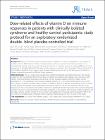| dc.contributor.author | WALSH, CATHAL | en |
| dc.contributor.author | FLETCHER, JEAN | en |
| dc.date.accessioned | 2014-12-16T11:13:22Z | |
| dc.date.available | 2014-12-16T11:13:22Z | |
| dc.date.issued | 2013 | en |
| dc.date.submitted | 2013 | en |
| dc.identifier.citation | O'Connell K, Kelly S, Kinsella K, Jordan S, Kenny O, Murphy D, Heffernan E, O'Laoide R, O'Shea D, McKenna C, Cassidy L, Fletcher J, Walsh C, Brady J, McGuigan C, Tubridy N, Hutchinson M, Dose-related effects of vitamin D on immune responses in patients with clinically isolated syndrome and healthy control participants: study protocol for an exploratory randomized double- blind placebo-controlled trial., Trials, 14, 2013, 272 | en |
| dc.identifier.other | Y | en |
| dc.identifier.uri | http://hdl.handle.net/2262/72486 | |
| dc.description | PUBLISHED | en |
| dc.description.abstract | Background
There is increasing evidence linking vitamin D deficiency to both susceptibility to, and severity of, multiple sclerosis (MS). Patients with the clinically isolated syndrome represent the initial presentation of a demyelinating disorder, and those with asymptomatic lesions on magnetic resonance imaging (MRI) are at risk of progression to clinically definite MS. The aims of this study are to examine the immunologic effects of vitamin D in both healthy individuals and in patients with clinically isolated syndrome, and in the latter group the effects on disease progression assessed by MRI and clinical measures.
Methods/Design
This is a single-center double-blind randomized placebo-controlled clinical trial. The primary endpoint is the immunologic effects of two doses of vitamin D compared with placebo over 24 weeks in both healthy control participants and patients presenting with the clinically isolated syndrome. Healthy control participants (n = 39) and patients with clinically isolated syndrome (n = 45) will be randomized to one of three arms, namely 1) vitamin D 5,000 IU daily, 2) vitamin D 10,000 IU daily, or 3) placebo, and followed up for 24 weeks. In both patients and healthy control participants, the primary outcome will be immunologic measures of the frequency of CD4 T-cell subsets and cytokine responses in peripheral blood mononuclear cells, assessed at baseline, and after 16 and 24 weeks of treatment. Secondary endpoints, in the patients with clinically isolated syndrome, will be relapse activity, and the number of new T2 lesions and gadolinium-enhancing lesions assessed by MRI in the two vitamin D-treated groups compared with the placebo-treated group over the 24 weeks of the study. | en |
| dc.format.extent | 272 | en |
| dc.language.iso | en | en |
| dc.relation.ispartofseries | Trials | en |
| dc.relation.ispartofseries | 14 | en |
| dc.rights | Y | en |
| dc.subject | Clinical trial | en |
| dc.subject | Cholecalciferol | en |
| dc.subject | Immunomodulation | en |
| dc.subject | Multiple sclerosis; | en |
| dc.subject | Clinically isolated syndrome | en |
| dc.subject | Vitamin D | en |
| dc.title | Dose-related effects of vitamin D on immune responses in patients with clinically isolated syndrome and healthy control participants: study protocol for an exploratory randomized double- blind placebo-controlled trial. | en |
| dc.type | Journal Article | en |
| dc.type.supercollection | scholarly_publications | en |
| dc.type.supercollection | refereed_publications | en |
| dc.identifier.peoplefinderurl | http://people.tcd.ie/walshc | en |
| dc.identifier.peoplefinderurl | http://people.tcd.ie/fletchj | en |
| dc.identifier.rssinternalid | 92326 | en |
| dc.identifier.doi | http://dx.doi.org/10.1186/1745-6215-14-272. | en |
| dc.rights.ecaccessrights | openAccess | |
| dc.subject.TCDTheme | Immunology, Inflammation & Infection | en |
| dc.subject.TCDTheme | Neuroscience | en |
| dc.subject.TCDTag | Immune System | en |
| dc.subject.TCDTag | Immunology, Immunotherapy | en |
| dc.subject.TCDTag | Inflammation | en |
| dc.subject.TCDTag | Neurodegenerative Diseases/Disorders | en |




